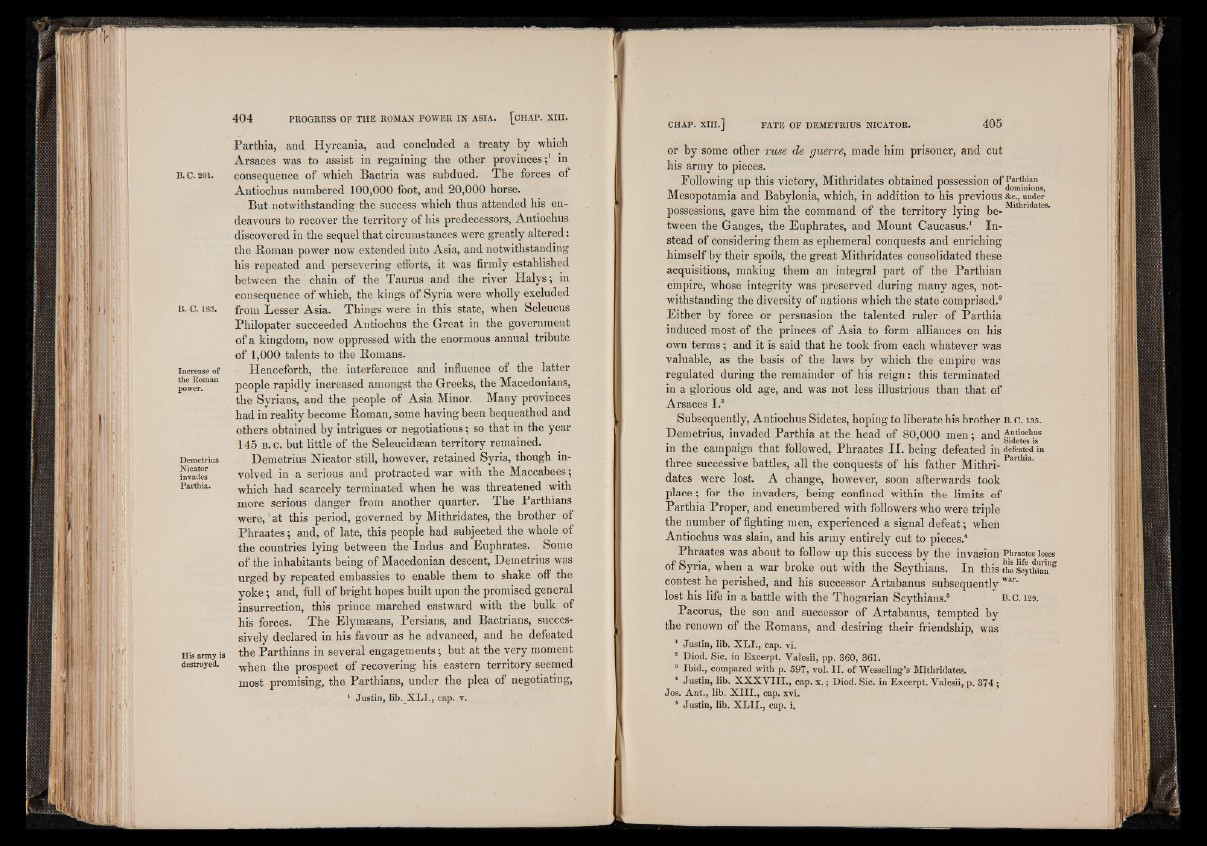
B. C. 183.
Increase of
the Roman
power.
Demetrius
Nicator
invades
Parthia.
His army is
destroyed.
Parthia, and Hyrcania, and concluded a treaty by which
Arsaces was to assist in regaining the other provinces;1 in
consequence of which Bactria was subdued. The forces of
Antiochus numbered 100,000 foot, and 20,000 horse.
But notwithstanding the success which thus attended his endeavours
to recover the territory of his predecessors, Antiochus
discovered in the sequel that circumstances were greatly altered:
the Boman power now extended into Asia, and notwithstanding
his repeated and persevering efforts, it was firmly established
between the chain of the Taurus and the river Halys; in
consequence of which, the kings of Syria were wholly excluded
from Lesser Asia. Things were in this state, when Seleucus
Philopater succeeded Antiochus the Great in the government
of a kingdom, now oppressed with the enormous annual tribute
of 1,000 talents to the Romans.
Henceforth, the interference and influence of the latter
people rapidly increased amongst the Greeks, the Macedonians,
the Syrians, and the people of Asia Minor. Many provinces
had in reality become Roman, some having been bequeathed and
others obtained by intrigues or negotiations; so that in the year
145 b . c. but little of the Seleucidaean territory remained.
Demetrius Nicator still, however, retained Syria, though involved
in a serious and protracted war with the Maccabees;
which had scarcely terminated when he was threatened with
more serious danger from another quarter. The Parthians
were,' at this period, governed by Mithridates, the brother of
Phraates; and, of late, this people had subjected the whole of
the countries lying between the Indus and Euphrates. Some
of the inhabitants being of Macedonian descent, Demetrius was
urged by repeated embassies to enable them to shake off the
yoke; and, full of bright hopes built upon the promised general
insurrection, this prince marched eastward with the bulk of
his forces. The Elymseans, Persians, and Bactrians, successively
declared in his favour as he advanced, and he defeated
the Parthians in several engagements; but at the very moment
when the prospect of recovering his eastern territory seemed
most promising, the Parthians, under the plea of negotiating,
1 Justin, lib. X L I., cap. v.
or by some other ruse de guerre, made him prisoner, and cut
his army to pieces.
Following up this victory, Mithridates obtained possession of Parthian
tvt . _ i i i t * • dominions, Mesopotamia and Babylonia, which, in addition to his previous &c., under
possessions, gave him the command of the territory lying between
the Ganges, the Euphrates, and Mount Caucasus.1 Instead
of considering them as ephemeral conquests and enriching
himself by their spoils, the great Mithridates consolidated these
acquisitions, making them an integral part of the Parthian
empire, whose integrity was preserved during many ages, notwithstanding
the diversity of nations which the state comprised.2
Either by force or persuasion the talented ruler of Parthia
induced most of the princes of Asia to form alliances on his
own terms; and it is said that he took from each whatever was
valuable, as the basis of the laws by which the empire was
regulated during the remainder of his reign: this terminated
in a glorious old age, and was not less illustrious than that of
Arsaces I.3
Subsequently, Antiochus Sidetes, hoping to liberate his brother B. C. 135.
Demetrius, invaded Parthia at the head of 80,000 men: and Antiochus . ? ’ Sidetes is
m the campaign that followed, Phraates II. being defeated in defeated in
three successive battles, all the conquests of his father Mithri- ar 'a‘
dates were lost. A change, however, soon afterwards took
place; for the invaders, being confined within the limits of
Parthia Proper, and encumbered with followers who were triple
the number of fighting men, experienced a signal defeat; when
Antiochus was slain, and his army entirely eut to pieces.4
Phraates was about to follow up this success by the invasion Phraates loses
of Syria, when a war broke out with the Scythians. In this the s I ja u T ®
contest he perished, and his successor Artabanus subsequently war'
lost his life in a battle with the Thogarian Scythians.5 B. c. 129.
Pacorus, the son and successor of Artabanus, tempted by
the renown of the Romans, and desiring their friendship, was
1 Justin, lib. X L I., cap. vi.
8 Diod. Sic. in Excerpt. Yalesii, pp. 360, 361.
8 Ibid., compared with p. 597, vol. I I . of Wesseling’s Mithridates.
* Justin, lib. X X X V I I I ., cap. x . ; Diod. Sic. ¡11 Excerpt. Valesii, p. 374 ;
Jos. Ant., lib. X I I I ., cap. xvi.
5 Justin, lib. X L I I ., cap. i.